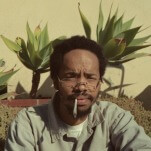Suburbicon
In Suburbicon, you can see the bones of the original screenplay that Joel and Ethan Coen wrote about 30 years ago. The filmmakers’ interest in crimes gone wrong and flawed men lit up by their impossible dreams is central to this tale of a seemingly perfect suburban community that, surprise, isn’t so picturesque after all. But what’s been added to that story ends up getting in the way, resulting in a movie that flits between genres and ideas without ever settling on one coherent, guiding principle. A lot of Coen alumni are in Suburbicon, but you long for the masters to intervene and take the wheel.
Instead, we have George Clooney, a Coen regular who, for the first time in his directorial career, hasn’t cast himself in one of his films. Suburbicon’s ensemble is fronted by Matt Damon, who plays Gardner, a corporate drone with little personality. In the late 1950s, he and his wife Rose (Julianne Moore), sister-in-law Margaret (also Moore) and son Nicky (Noah Jupe) reside in Suburbicon, a suburban American idyll populated by prosperous middle-class families like themselves. But all is not well now that a black family (led by Leith Burke and Karimah Westbrook) has moved in, raising fears of sinking property values and rising crime. Naturally, the fact that they seem like a completely law-abiding, well-to-do family means nothing to the community’s distrustful, racist white denizens.
In one of Suburbicon’s strained ironies, the townspeople’s ignorance is juxtaposed with actual wrongdoing going on right under their noses. In the middle of the night, Gardner and his family are assaulted by two crooks who take them prisoner for reasons that aren’t clear. While chloroforming each of the family members, the criminals use too much on Rose, putting her in a coma that eventually kills her. Gardner is devastated, but Nicky begins noticing that Margaret seems to have assumed his dead mom’s place within the family. He’s even more alarmed when his dad goes to a police lineup to identify the crooks—and then declines to name them, allowing them to go free.
Something’s rotten in the state of Suburbicon, and for a while Clooney has fun letting the mystery unspool. Because we see these events from the boy’s perspective, there are extra layers of slithering dread in watching Nicky discover that his perfect family has long been a lie. In such moments, Suburbicon has the potential to be a deft coming-of-age thriller, as shades of Hitchcock start to creep into the film’s portrayal of Gardner, a dull nobody with a dark streak beneath his conservative wardrobe, nerdy glasses and muted demeanor.
Suburbicon couldn’t ask for a better cast—Oscar Isaac shows up at about the halfway point to steal the movie as a suspicious insurance-claim inspector—and its below-the-line talent is equally stellar. The mid-century period detail is all immaculate thanks to production designer James D. Bissell, and the movie (shot by Oscar-winner Robert Elswit) looks like it’s an accomplished, ambitious undertaking. But whereas Clooney encourages us to inspect Suburbicon’s jaundiced underbelly, the problem with Suburbicon is that viewers will soon realize that there’s not much to the film beyond its gorgeous design.
-

-

-

-

-

-

-

-

-

-

-

-

-

-

-

-

-

-

-

-

-

-

-

-

-

-

-

-

-

-

-

-

-

-

-

-

-

-

-

-








































